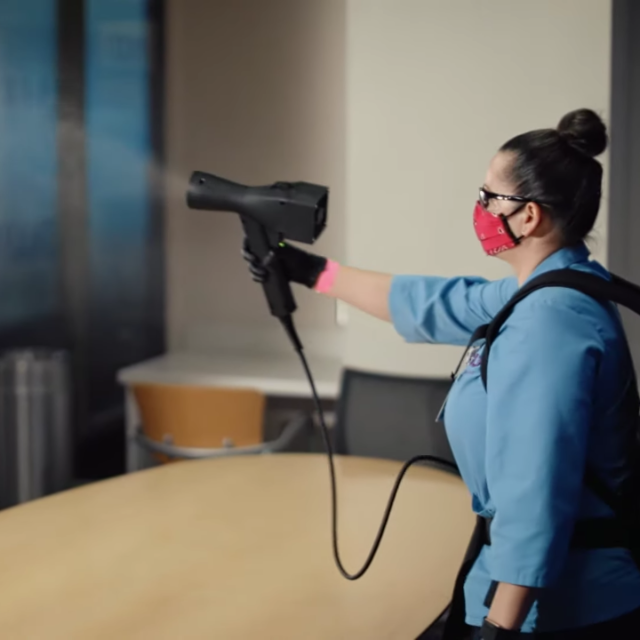From the onset of pandemic concerns, the team at TCU Facilities has provided boots on the ground to ensure a safe campus environment. Todd Waldvogel, P.E., associate vice chancellor for Facilities & Campus Planning, provides answers to questions about TCU’s new cleaning protocols and what to expect when students return to campus for fall.
How would you describe the impact of the COVID-19 pandemic on TCU Facilities operations?
TW: Challenging, but I’m proud TCU Facilities has, and continues to, respond accordingly. I like to say TCU Facilities never really left — we just spread out over space and time. Throughout the pandemic response, our team adjusted schedules, realigned tasks and managed relationships to keep facilities and utilities available to the students, faculty and staff who remained on campus and required support. And the team did so with an unwavering commitment to community safety.
How have cleaning protocols changed during the pandemic?
TW: Increased cleaning protocols include twice-per-day cleaning/disinfection of high touch areas. Electrostatic misting (“e-mist”) will be used to supplement initial cleaning and disinfecting in heavily trafficked public spaces. Cleaning supplies have been provided for each building to allow occupants to self-sanitize their private and shared workspaces. In order to support the extra efforts and reduce traffic in private spaces, we’ve decreased housekeeping service in individual offices and ask occupants to manage their trash. More details are available in this Coronavirus FAQ.
What new safety measures have you put into place across campus?
TW: In coordination with the campuswide response, TCU Facilities implemented many improvements. We installed new heating, ventilation and air-conditioning measures in the TCU Health Clinic to provide medical-grade air treatment. Across the rest of campus, we increased fresh air intake for our heating, ventilation and air-conditioning systems in accordance with Centers for Disease Control and industry recommendations — additional fresh air in modern, well-maintained HVAC systems like we have at TCU helps with virus dilution in interior spaces. We also developed classroom capacities and layouts to meet physical distancing requirements, and we’re in the process of reconfiguring the rooms accordingly. Similarly, we’ve worked with many departments to adjust room/office layouts and, where appropriate, install plastic barriers. We developed a robust program of signage that is currently being installed — lots of signs to remind and assist people with making good decisions.
What are the criteria for new safety measures, such as plastic shields?
TW: Barriers for airborne droplets are recommended for areas in which individuals must remain at a work station to conduct frequent, prolonged and/or close contact with members of the general public. Beyond these transaction desks, TCU Facilities has been working with departments to determine appropriate locations for barriers and support.
Can employees request equipment such as plastic shields or additional cleaning supplies?
TW: Yes. We request that employees work with their building managers if possible to coordinate additional support and/or cleaning supplies. If you are not sure who your building manager is and/or to request additional assistance or cleaning supplies, contact TCU Facilities Customer Service at x7956.
We’ve all seen empty cleaning product shelves at our favorite grocery stores — has your department had trouble finding supplies?
TW: Yes. The supply chain for many traditional products has been challenged. However, we’ve generally been able to supplement with alternate brands or different products to meet our needs.
What product has been the biggest challenge to find?
TW: Disinfecting wipes in small packaging. We can find big tubs, but those aren’t as easy to distribute into smaller areas.
Have y’all had to get creative with any particular cleaning supplies?
TW: Yes, but mostly behind the scenes. We’ve been able to distribute the most convenient products to building occupants, and our professional housekeeping teams have adjusted their actions with alternative strategies. For example, with the temporary shortage of disinfecting wipes, we distributed the wipes across campus and our housekeeping teams use rags and liquid disinfecting agents. Also, you will see many large pump bottles of hand sanitizer in buildings on wooden stands supplementing the limited supply of foaming hand-sanitizing stations.
What changes can students, faculty and staff expect when they return to campus for fall?
TW: Everyone will need to be active participants in our community’s safety. All the cleaning supplies and physically distanced rooms aren’t going to matter if our students, faculty and staff don’t personally commit to staying home when sick, keeping a safe distance from people and wearing face coverings. Unrelated to the pandemic, the TCU community will notice the tranquility of construction and ease of campus pedestrian movement — by the start of school, the only active major construction project will be the privately-owned hotel on campus, and it’s conveniently located on the perimeter of daily activity.
Will TCU Facilities provide face coverings to employees or students?
TW: TCU Facilities has supported Student Affairs with the procurement of welcome packages for students that include face coverings. Likewise, TCU Facilities is serving as the university’s primary procurement agency for disposable face coverings that will be distributed campuswide upon demand and clear plastic face covering shields for faculty and staff as requested by departments. Human Resources will provide one purple cloth face covering per employee as well.
How can individual members of the campus community do their part to keep TCU as safe as possible?
TW: Be vigilant and personally accountable! Stay “home” when sick or with fever. Wash your hands frequently. Cough/sneeze into your elbow. Wear a face covering. Physically distance. Politely remind others you encounter who aren’t complying. And be kind — this pandemic is really tough, but we’re all in it together!
